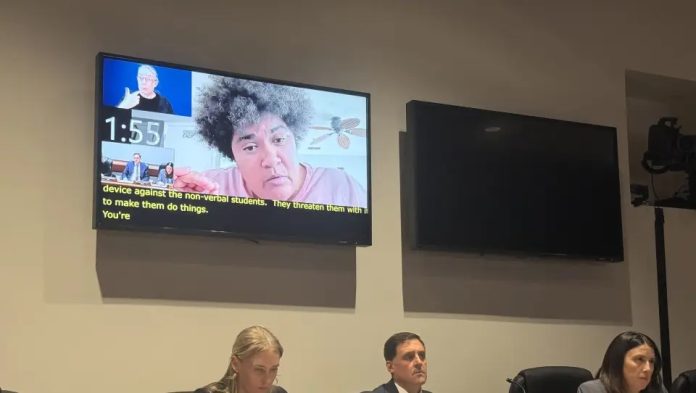Massachusetts legislators heard emotional testimony this week urging a ban on electric shock therapies for people with disabilities, with former Judge Rotenberg Educational Center student Jennifer Msumba pleading, “You have to stop this,” as she recounted years of alleged abuse at the Canton facility during a State House hearing.
Bill details
The proposed bill would prohibit any program “funded, operated, licensed, or approved” by the state from inflicting physical pain on individuals with physical, intellectual, or developmental disabilities, and from depriving them of essentials such as “reasonable” sleep, food, and shelter, according to testimony presented Tuesday.
Focus on JRC practices
Much of the hearing centered on so-called aversives at the Judge Rotenberg Educational Center (JRC), the nation’s only known facility using electric shocks to control behavior, where residents wear shock devices in backpacks that staff can activate, witnesses told lawmakers.
Testimonies
Msumba, who lived at JRC for seven years, testified virtually that staff used devices against nonverbal students, threatened shocks to enforce compliance, and hid students and equipment from visitors, calling her experience “abuse” and imploring legislators to end the practice because it is “torturous to your mind and body.” Jennifer Msumba told lawmakers during her virtual testimony that the seven years she spent at the center were characterized by persistent mistreatment and acts she described as abusive.
“The staff are abusive, they use the device against the nonverbal students, they threaten them with it to make them do things,” Msumba said. “You’re not allowed to say the word ‘no,’ or not follow directions, you will get shocked.”
Ashten Vassar-Cain, describing himself as a survivor of institutional abuse, testified that the use of aversive shock treatments left him deeply scarred, fostering long-lasting trauma, fear, and psychological distress that continue to affect his well-being.
“Aversives did not heal me. Instead, they created fear, shame, pain, and debilitating PTSD. They made me fearful of seeking help from providers, and have resulted in long-term physical and mental health struggles,” Vassar-Cain said. “I never want anyone to suffer this type of abuse.”
Regulatory and legal backdrop
The Food and Drug Administration has sought to ban these shock practices since 2020, but federal courts have rejected the ban; repeated attempts in the Massachusetts Legislature to prohibit the practice have not yet succeeded, setting the stage for renewed state-level action.
No one spoke in defense of shock therapy during the hearing, but in an email after the proceedings, JRC officials said parents and guardians would continue to fight to preserve what they called a “life-saving” electrical stimulation device treatment for 54 individuals who have failed all other options, arguing that removing ESDs is a “matter of life or death.”
Electroconvulsive Therapy (ECT) is a psychiatric holdover from the 1930s that uses up to 450 volts of electricity to shock the brain to trigger a grand mal seizure. According to Stop ECT, ECT is still legal in all 50 states and used on vulnerable populations—including children, veterans, women with postpartum depression, and the elderly.



